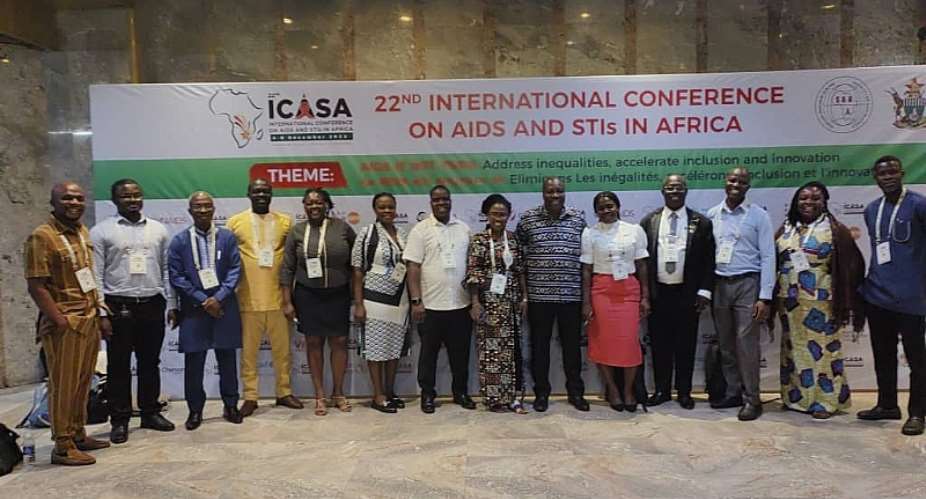Ms. Winnie Byanyima, Executive Director, UNAIDS Under-Secretary-General, United Nations, has reiterated that the commemoration of World AIDS Day under the theme “Let Communities Lead” should resonate across the globe.
She said global tensions, conflict, and economic crises have exacerbated inequalities, threatening the hard-won gains of the AIDS response and progress towards the achievement of the Sustainable Development Goals.
“But communities and others all over Africa are coming together to hold leaders to their promise of ending AIDS by 2030. There is a path that ends AIDS, and communities will not be deflected from it,” she emphasized.
Ms. Byanyima stated this at the ongoing 22nd edition of the International Conference on Aids and Sexually Transmitted Infections in Africa (ICASA) in Harare, Zimbabwe.
The ICASA 2023, which started on December 4 and is expected to end on Saturday, December 9th, is on the general theme “AIDS is not over: Address inequalities, accelerate inclusion, and innovate."
It is being organized by the Society for AIDS in Africa in collaboration with the government of Zimbabwe and other partners, including the World Health Organisation, the Global Fund, and others.
She noted that communities cannot be distracted from achieving the 95-95-95 targets for everyone, including young women and girls and key populations.
The UNAIDS Executive Director and Under-Secretary-General of the United Nations revealed that Botswana, Eswatini, Rwanda, Tanzania, and Zimbabwe have already achieved the “95-95-95” targets.
“A further 16 countries, eight of them in sub-Saharan Africa, are also close to doing so, but we have more challenges to address,” she stated.
Ms. Byanyima noted that African Heads of State and governments will be meeting soon to renew their commitment to ending AIDS.
Dr. Natalia Kanem, Executive Director, UNFPA, noted that world leaders at the 78th Session of the UN General Assembly in New York in September reflected on progress towards the Sustainable Development Goals (SDG) at the midpoint of 2030.
She said the consensus was clear that the SDG targets are off track, and the HIV and AIDS response is no exception.
“As we gather for the largest AIDS conference in Africa, the continent that carries the highest burden of HIV and AIDS, let us commit to doing business unusually.
“Our global success in ending AIDS as a public health threat will be determined by what unfolds here. We know that inequality remains the biggest barrier,” she stated.
Dr. Kanem said populations at high risk of HIV face multiple disadvantages that deepen their vulnerabilities, stressing gender discrimination and a lack of bodily autonomy that hinder women’s and girls’ ability to protect themselves.
In 2022, they accounted for 60 percent of new HIV cases in sub-Saharan Africa. HIV infection rates are three times higher among adolescent girls and young women than boys and men of the same age.
“We have the tools to end new HIV infections and make AIDS history. What we require is sustained financing and commitment at the political and community levels, and above all, inclusion and respect for the rights of all people.
“Let us use this powerful forum to listen, learn, and work together to bring about the change we need for the health of Africa and for the good of all," Dr. Kanem noted.
Dr. Matshidiso Moeti, World Health Organisation (WHO) Regional Director for Africa, in her remarks, said “It is a collective duty to raise our voices and acknowledge that AIDS is not over. While significant progress has been made in the fight against HIV/AIDS, we must recognize that inequalities persist and hinder our ability to effectively combat this pandemic.
“We need to prioritise targeted interventions and allocate resources towards vulnerable groups, ensuring they receive the necessary tools and support to prevent new infections and live healthy lives,” Dr. Matshidiso Moeti stated.
Dr. Meoti explained that accelerating inclusion means ensuring that those affected have a seat at the decision-making table and are empowered to actively participate in shaping policies, programmes, and research.
“Together, let’s use the opportunity of ICASA 2023 to renew our commitment. Let us highlight the inequalities that persist, accelerate inclusion, and drive innovation. Only by taking these steps can we truly envision a future without AIDS,” the WHO Regional Director for Africa stated.
-CDA Consult || Contributor





 List of 24 ministerial nominees approved by Parliament
List of 24 ministerial nominees approved by Parliament
 You were my inspiration, made me who I am today – Lilian Kumah
You were my inspiration, made me who I am today – Lilian Kumah
 Rainstorm destroys Hohoe E.P. Senior High School building
Rainstorm destroys Hohoe E.P. Senior High School building
 John Kumah strongly supported me to become NPP flagbearer – Bawumia reveals
John Kumah strongly supported me to become NPP flagbearer – Bawumia reveals
 Late John Kumah urged me to run for NPP flagbearer, strongly supported me — Bawu...
Late John Kumah urged me to run for NPP flagbearer, strongly supported me — Bawu...
 Akufo-Addo appoints Joseph Kpemka as Deputy MD of BOST
Akufo-Addo appoints Joseph Kpemka as Deputy MD of BOST
 Ablakwa petitions CHRAJ to investigate sale of SSNIT's hotels to Rock City Hotel
Ablakwa petitions CHRAJ to investigate sale of SSNIT's hotels to Rock City Hotel
 MoF to provide new bailout for defunct Gold Coast Fund investors – Bawumia revea...
MoF to provide new bailout for defunct Gold Coast Fund investors – Bawumia revea...
 OMCs implement price adjustments despite International petroleum price declines
OMCs implement price adjustments despite International petroleum price declines
 Petition to remove Kissi Agyebeng will disrupt operations of OSP – Martin Kpebu
Petition to remove Kissi Agyebeng will disrupt operations of OSP – Martin Kpebu
